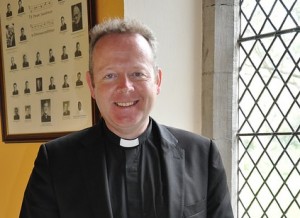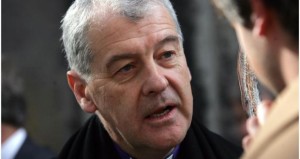
By Sarah Mac Donald - 06 April, 2015
 The Primate of All Ireland, Archbishop Eamon Martin, has paid tribute to President Michael D Higgins’ efforts over the past eighteen months to encourage a national conversation about ethics.
The Primate of All Ireland, Archbishop Eamon Martin, has paid tribute to President Michael D Higgins’ efforts over the past eighteen months to encourage a national conversation about ethics.
In an opinion article for the Irish Mail on Sunday, the leader of the Catholic Church said the President’s ‘Ethics Initiative’ has already received important contributions from Third Level institutions and many others in civil society.
Recently the Irish Congress of Trade Unions launched a worthwhile discussion on ethics in employment and in the workplace.
“Unless, as a nation, we have a clear sense of our fundamental values and principles, together with a vision for the common good in Irish society, the causes of preventable suffering will only fester and multiply,” Dr Martin warned.
He also said it was worth asking ourselves in Ireland whether the common good is being served any better today than it was a generation ago.
“What foundational ethical principles do we want to be in place in Ireland? What moral compass is guiding us as we make the critical decisions that will impact on society today and in the future?” the Archbishop asked.
The senior churchman suggested that Catholic social teaching can make an important contribution to this discussion.
According to the Archbishop of Armagh, some people have described this rich body of teaching, especially its developments from the Pope Saint John XXIII’s Pacem in Terris (Peace on Earth) to Pope Benedict XVI’s Deus Caritas Est (God is Love), as ‘the Church’s best kept secret’!
Others suggest that, because of recent scandals, the Church should remain silent in national conversations about ethics.
In his article for the Easter Sunday issue of the Irish Mail, the Primate of All Ireland said on the contrary, “I believe it would greatly impoverish debate if the principles of Catholic social teaching were left unheard: for example, our strong belief in the dignity of every human person; respect for human life from the first moment of conception to natural death; the importance of family as the basic cell of society; respect for the dignity of work and the worker; care for the poor and the marginalised; the importance of subsidiarity and solidarity; promotion of a fair distribution of the world’s goods; and, care for creation.”
He added that he hoped that the Catholic Church can continue to bring its sincerely held beliefs and convictions to the national debate – not to dominate, but to enlighten and encourage dialogue.
Referring to the theological significance of Easter, Archbishop Martin said that if the story of salvation had ended on Good Friday, Christians would be a people of despair, only able to cry out as Jesus did on the Cross “my God, my God, why have you abandoned us?”
He explained that this year he joined with his Church of Ireland counterpart, Archbishop Richard Clarke, the Church of Ireland Primate of All Ireland, in issuing a message for Holy Week and Easter.
“We pointed out that on Good Friday, “it seemed that the worst that the world can do was victorious over the best that there can ever be. The crucifixion was the rejection of all that it is to be truly human. It was the refusal to believe that only in Christ can men and women find their truest identity and fullest humanity. It was the attack of darkness on the reality of a total Love”.
“Archbishop Richard and I went on to say that all around “we still see powerful signs of that same darkness in our world. It is found in in the horrors of cruel and vicious inhumanity to those who are seen as other; in the day to day debasement of the dignity of those who are unable to defend themselves; in physical violence, murder, war and persecution. It issues in the extreme selfishness of some individual lives that have fallen away catastrophically from any generosity and forgiveness”.
Dr Martin underlined that Christians are challenged to be Easter people, to spread the message of hope into the reality of life which is often overwhelmed by darkness and despair.
“The Christian vocation is to seek out and accompany those who suffer a long ‘Good Friday’, and open to them the promise of resurrection,” he explained.
Referring to Pope Saint John Paul II’s Apostolic Letter, Salvifici Doloris (Salvific Suffering), in which he explored the meaning of suffering in union with Christ, the Primate recalled that the Polish pontiff had died ten years ago this weekend after enduring prolonged suffering with Parkinson’s disease.
“He pointed to the sense of uselessness, of being a burden that sick people can feel, especially when they are dependent on others for everything. Pope St John Paul encouraged them to realise they were sharing in the suffering of Christ. In this way they carry out an ‘irreplaceable service’, completing ‘what is lacking in Christ’s afflictions’ and thereby serving the salvation of others (SD 27),” he explained.
“This does not mean we should remain totally passive in the face of suffering. We must strive to alleviate it where possible,” the Archbishop of Armagh warned.
“Every Christian, and all people of good will, has a responsibility to work earnestly for an end to injustice, greed, selfishness and exploitation which is at the root of so much preventable suffering and inhumanity in the world,” he said.
St Paul describes the Resurrection of Christ as the “first fruits”- evidence that there will be a harvest of hope, and a final victory of love over hatred, injustice and futility, he added.
 Separately, the Church of Ireland Archbishop of Dublin, suggested in his Easter Sunday homily that the Christian community has become “too reliant on formal institutions, inside and outside the churches, to carry our discipleship”.
Separately, the Church of Ireland Archbishop of Dublin, suggested in his Easter Sunday homily that the Christian community has become “too reliant on formal institutions, inside and outside the churches, to carry our discipleship”.
In his homily on Sunday in St Patrick’s Cathedral, Archbishop Michael Jackson told the congregation, “We have disempowered ourselves in regard to opening our own eyes and ears, hearts and hands to meet and to walk with those who form a community by virtue of their being with one another and who form our community by virtue of our being with them.”
“They are unavoidable whether we reject them or embrace them; they are still there.”
He stated that they are the people who are made victims of insufficient provision for survival and for dignity at home.
“They are the people who are trapped in the cycle of injustice which is widely understood to characterize the selective distribution and withholding of wealth at home and abroad; they are the people who ask for nothing but, like us, hope for everything that is good and find that the unyielding wilderness in all of its contemporary gracelessness and Godlessness is the only place they can inhabit because the door of compassion and recognition is shut in their faces – inside and outside the very same church.”
Archbishop Jackson added, “We need to make this contemporary wilderness a place of everlasting love as Jeremiah names it.”